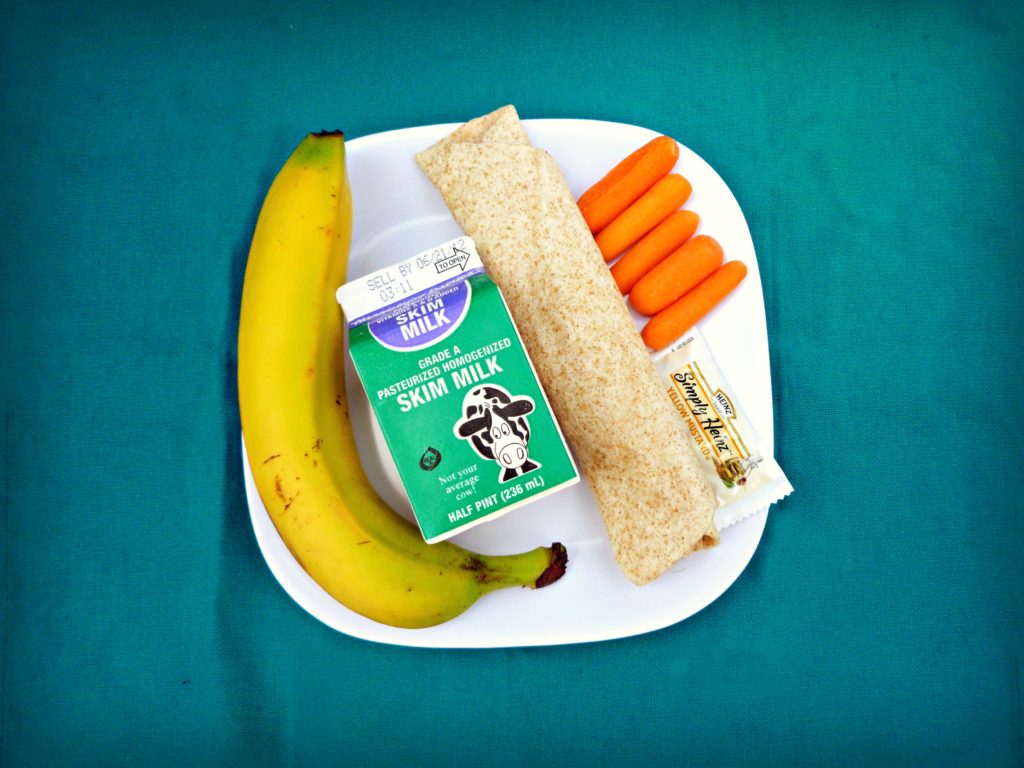This piece was originally published in The Inquisitive Eater Anthology, which you can now purchase online.
The assistant principal led them to the cafeteria. Marisa reeled from the familiar odor, a mix of institutionally re-heated carbohydrates and that pink soap that had been around since she was in elementary school.
She feared a gagging sound from Hazel or a pinched nose. The girl had been sullen ever since they got to town, missing her father who’d left to find work, her friends, their old house back in Galveston, where the toxic waters had risen. Outside, Marisa had promised her daughter an ice cream if she would pull it together and smile. They needed a seat in the overcrowded second grade.
The lunch room looked small for one thousand students. There were the long tables and benches, the windows that failed to exchange the stale air indoors with the blanket of humidity outside, the posters designed with the intent to get kids to eat. Chicken and waffles with syrup. Butter rolls. Hamburgers so plump and greasy they couldn’t possibly come out of this kitchen. What about healthy eating? Marisa wanted to ask. What about heart disease? What kind of a future were they preparing these children for?
“Banana splits!” Hazel shouted.
“Sweetie, we talked about this.”
“No, really, Mama. They have banana splits here. Look!”
Hazel pointed at a poster above the exit. Ms. McConnell looked like a practical sort of woman. How could you? Marisa wanted to say.
With the roads sunk, bananas were the first perishable to disappear from Galveston forever. First there were too many, arriving overripe and dinged up. People mushed them up into breads and body scrubs, used old peels to polish the silver and whiten their teeth, anything to make use of the surplus. What couldn’t a banana peel do? It could bring up a splinter, fix a scratched CD. Just when the survivors of the storm were hooked on the utility of the fruit, farmers gave up on bananas entirely, replanting their fields with crops that would be hardier in the heat.
“But bananas are my favorite,” Hazel had cried when Marisa could no longer find bananas at the store. PB&Bs, banana pancakes, fruit salads—the girl had practically lived on these things
“You really shouldn’t torture children like that,” Marisa said to Ms. McConnell.
“I love banana splits, too,” the woman whispered to Hazel, the round a’s in the word revealing a northern accent.
“But there are no bananas,” Marisa said, feeling foolish for pointing out the obvious.
“Whatever your family’s particular beliefs, our teachers will work to respect them.”
“We believe there are actually no more bananas. They’re finished. Done.”
“Of course.” Ms. McConnell winked at Hazel. “Now, follow me and I’ll show you the gymnasium.”
It’s just for this year, Marisa told herself. But then what? Would they just keep moving further north?
They’d have to make this work for now. Hazel was a strong-willed child; she needed to be around other children. Maybe she’d have friends here. Maybe Marisa would meet a like-minded mom who saw the world the way she did.
“I like this school,” Hazel said, tugging Marisa’s hand to come.
Alison B. Hart’s writing has appeared in The Missouri Review, Joyland, Literary Hub, and elsewhere. She is the co-founder of the long-running reading series at Pete’s Candy Store in Williamsburg.
Featured image via Flickr.


Comments are closed.